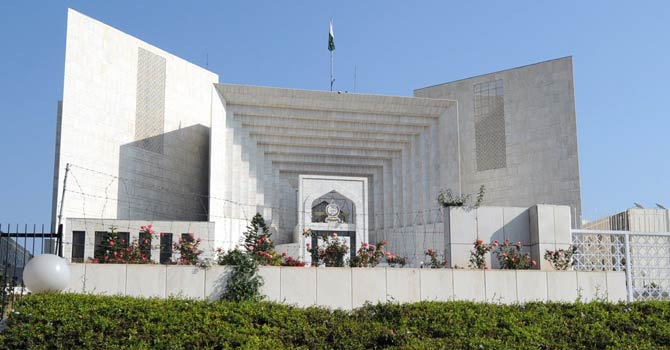ISLAMABAD: There may be something more in store in the continuing executive-judiciary saga. Thursday’s proceedings of the case about the ISI doling out funds to politicians in the 1990s took a new twist when the Supreme Court decided to focus its attention on political activities in the presidency.
In an unexpected move, a three-judge bench comprising Chief Justice Iftikhar Mohammad Chaudhry, Justice Jawwad S. Khawaja and Justice Khilji Arif Hussain which had taken up the 1996 petition of Tehrik-i-Istiqlal chief Air Martial (retd) Asghar Khan made the president’s office a necessary party through his Secretary General Salman Farooqi.
The order came because the proceedings of the day unravelled that the ‘cell’ set up to tamper with the 1990 elections was being controlled by the presidency. As a result, the court decided to make the current occupant of the top office a necessary party.
“In view of the constitutional importance of the President of Pakistan who apparently is a symbol of the unity of republic, he cannot undertake such (political) activities in pursuance whereof allegedly one particular group of the political parties was being supported in the name of national interest,” the court said in its order.
Legal observers are of the opinion that any adverse direction, after hearing the point of view of the presidency, may have a significant and far-reaching impact on the next general elections. After all it is widely known that President Asif Ali Zardari is overseeing the entire electoral exercise from the presidency.
The notice was issued to the President House at the request of Asghar Khan’s counsel Advocate Salman Akram Raja and in view of an earlier statement by former ISI director general Lt-Gen (retd) Asad Durrani that the election cell had been constituted in the presidency on the instructions of then president Ghulam Ishaq Khan. Ijlal Haider Zaidi and Roedad Khan were members of the cell.
In his petition, Asghar Khan accused the ISI of financing politicians in the 1990 elections by dishing out Rs140 million to create Islami Jamhoori Ittehad and block Benazir Bhutto’s PPP from winning. The petition was based on the affidavit of Gen Durrani. “There should not be any political cell in the presidency because the Constitution bars political activities in the highest office of the country,” the court observed.
The court noted that Salman Raja, while reading contents of different documents and pleadings, had pointed out that the cell functioned at the presidency in 1990.
It was also on record, according to the documents, that at some stage late president Farooq Ahmed Khan Leghari also had held consultations with late prime minister Benazir Bhutto and late interior minister Naseerullah Babar wherein affairs of the cell constituted to support the alliance of political parties were discussed.
“Therefore, it is necessary to have the viewpoint of the presidential office through its secretary because we are of the considered opinion that under Article 41(1) of the Constitution the president being head of the state represents the unity of the republic and under Article 243(2) of the Constitution the supreme command of the armed forces vest in the President.
“On having considered the answer of the counsel and the legal provisions as well as the material which has been gone through so far, we consider it appropriate to implead the office of the president as party through its secretary (general),” the order said.
The court asked its office to send the copy of the order and copies of pleadings, except the classified documents, along with a letter informing the secretary that the office of the president had been made a party.
The court also asked the presidency to make arrangements for the appearance of the secretary if so advised and desire on Oct 15.
The court allowed Roedad Khan to become a party in the matter.
NO CELL IN ISI: Defence Secretary Lt-Gen (retd) Asif Yasin Malik submitted a written statement saying that at present no political cell was functioning in the Directorate General, ISI, or any other agency working under the administrative control of the defence ministry.
Interior Secretary Khawaja Siddiq Akbar also filed a statement which said that the Intelligence Bureau (IB) and the ISI were not working under the administrative control of the interior ministry. Besides, no agency under the administrative control of the interior ministry is running any political cell.
He informed the court that the IB functioned under the administrative control of the cabinet division.
The court decided to issue notice to Cabinet Division Secretary Nargis Sethi who is required to certify whether there is a political cell in the IB or if one existed in the past.
“This certificate/statement must reach the registrar office before the next date of hearing,” the court said.











































